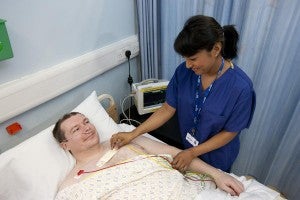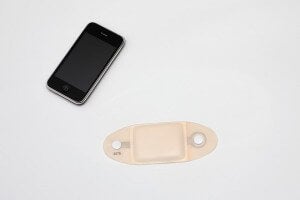
Patients at a hospital seem to be caught in a web of wires, sticky pads, and monitors, but that may all change very soon. According to the recent press release, Toumaz Technology, makers of the Sensium biomonitoring platform, are working with Imperial College London to test Digital Plaster, a wireless and disposable patch that transmits a patient’s vital signs. The trial will test to see if Digital Plaster works as well as traditional gold-standard monitors and should finish by the end of this year. If it proves successful, Toumaz could set the industry standard for disposable wireless health monitors.
When I talked with Keith Errey, CEO of Toumaz, this summer the digital plaster concept was just being sent off for large scale production. Seeing this trial underway lends credit to the other possibilities for which the Sensium technology is slated (such as expanding into veterinary, military, and law enforcement).Eventually, the disposable monitor (which already measures heart rate, temperature, and respiration) could be the only piece of equipment on your body when you are in a hospital. Slap it on when you come in, throw it away when you leave, digital plaster could simplify your stay and remove the need for all the wires. Digital Plaster will also allow doctors to have access to patients’ vital signs, or be alerted to their change, via secure link on a mobile phone.

The trial for Digital Plaster will take place in three parts: non-patient volunteers, then patients after surgery, and general patients with a specific healthcare problem. These sections should give researchers insight into how the technology excels or fails in different situations in a hospital setting. Even if the results from the trial are less than appealing, the basic premise for the technology is sound. As the number of vital signs doctors are interested in increases, and monitors produce more data, it will become very important to have a single point of access to all that information. The Sensium platform, or another technology like it, could be such an access point and help doctors keep track of patients in real time. Hopefully that will lead to healthier and happier hospital visits.
[photo credits: Toumaz Technology]


